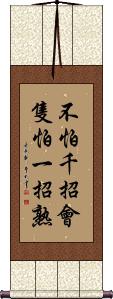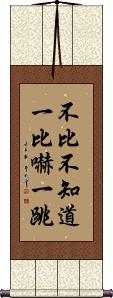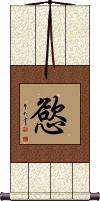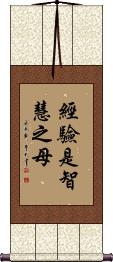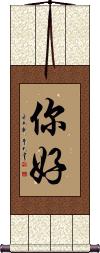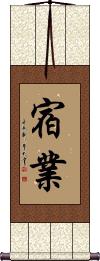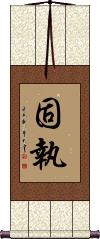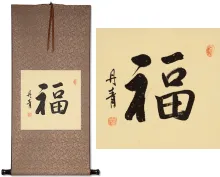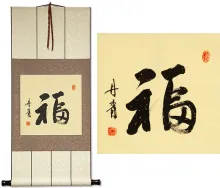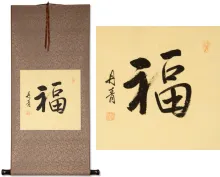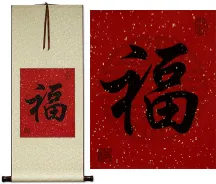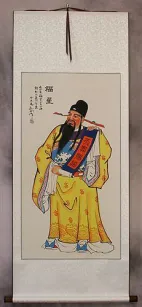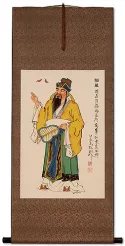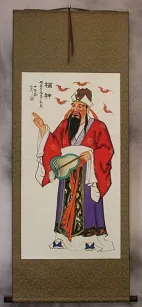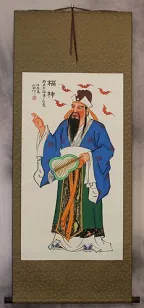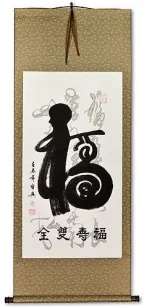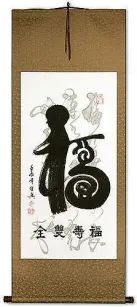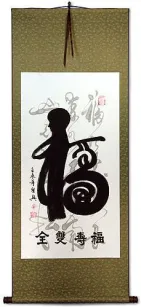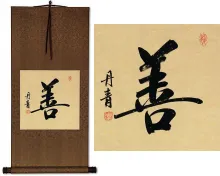Many custom options...
And formats...

The name Good and Bad in Chinese / Japanese...
Buy a Good and Bad calligraphy wall scroll here!
Personalize your custom “Good and Bad” project by clicking the button next to your favorite “Good and Bad” title below...
1. 1000 good moves ruined by 1 bad
2. Comparison Leads to Truth and Enlightenment
4. Experience is the Mother of Wisdom
6. Karma
7. Persistence
1000 good moves ruined by 1 bad
不怕千招会只怕一招熟 is a Chinese proverb that literally translates as: Do not worry about making a thousand clever moves; what [one has to] fear is one bad move.
Figuratively, this means: Even if you have made many clever moves before, one wrong move will ruin the whole game.
I compare this to the English saying, “It takes only one Aw-shit to wipe out a thousand Attaboys.”
Comparison Leads to Truth and Enlightenment
不比不知道一比吓一跳 is a Chinese proverb that literally means: [If one not does] not make comparisons, [one will] not know [the truth] when [one] compares, [one will be] greatly surprised.
This goes to the idea that if you do not know bad times, you cannot know what good times are.
...And...
You can not know light without experiencing darkness.
Another way to translate this would be: If you wish to be enlightened, you need to make comparisons and analyze every aspect (of a situation, issue, or problem).
Desire / Longing / Craving
慾 means desire, longing, appetite, wish, covetousness, greed, passion, desire, avarice, and craving.
慾 is universal in Chinese, Japanese Kanji, and Korean Hanja.
The context in which this character is used determines whether the meaning is good or bad. As a single character on a wall scroll, you get to decide what the definition is to you (hopefully more toward desire than greed).
![]() Please note that Japanese use a simplified version of this character - it also happens to be the same simplification used in mainland China. Click on the character to the right if you want the Japanese/Simplified version of desire.
Please note that Japanese use a simplified version of this character - it also happens to be the same simplification used in mainland China. Click on the character to the right if you want the Japanese/Simplified version of desire.
Experience is the Mother of Wisdom
It's been said that wisdom comes from good judgment, and good judgment comes from experience, while experience comes from a series of times when you used bad judgment.
經驗是智慧之母 is a Chinese proverb that makes the simplest connection between experience and wisdom.
See Also: Failure is the Mother of Success | Wisdom | Learn From Wisdom
Hello / Ni Hao
你好 is the day-to-day way to say hello in Chinese.
The characters literally mean, “You good?” It's the equivalent of “What's up?” in English, where nobody expects an actual answer.
This explanation is here for educational purposes only. 你好 is an oral word that is not appropriate for a scroll (not a bad meaning, just very odd for a wall scroll).
Karma (of your past lives)
宿業 is the Buddhist concept of Past Karma. Simply put, it's the sum of all the good and bad from all previous lives (perhaps earlier in your current life). This term is not commonly used outside of the Buddhist faith (you'll have a tough time finding a non-Buddhist Asian person that knows this word).
Other ways to translate this are “The karma of previous existence,” “The karma remaining from prior existences,” or simply “Former karma.”
See Also: Buddhism
Persistence
固執 can also mean “opinionated” or “stubborn” in Chinese and Japanese, but in the nicest way possible (still bad).
This just means “stubborn” in Korean (not a good scroll if your audience is Korean, in fact, we don't recommend this word at all). There are better ways to express this idea, such as tenacity/tenacious or perseverance... ...see the links below...
See Also: Tenacious | Fortitude | Perseverance
This in-stock artwork might be what you are looking for, and ships right away...
Gallery Price: $65.00
Your Price: $39.88
Gallery Price: $90.00
Your Price: $49.88
Gallery Price: $65.00
Your Price: $39.88
Gallery Price: $65.00
Your Price: $39.88
Gallery Price: $200.00
Your Price: $69.88
Good Luck Special Calligraphy Wall Scroll
Discounted Blemished
Gallery Price: $31.00
Your Price: $17.00
Good Luck Special Calligraphy Wall Scroll
Discounted Blemished
Gallery Price: $35.00
Your Price: $19.00
Good Luck Special Calligraphy Wall Scroll
Discounted Blemished
Gallery Price: $31.00
Your Price: $17.00
Gallery Price: $65.00
Your Price: $39.88
Not the results for good and bad that you were looking for?
Below are some entries from our dictionary that may match your good and bad search...
| Characters If shown, 2nd row is Simp. Chinese |
Pronunciation Romanization |
Simple Dictionary Definition |
業 业 see styles |
yè ye4 yeh waza わざ |
More info & calligraphy: Karmadeed; act; work; performance; (personal name) Hajime karman, karma, "action, work, deed"; "moral duty"; "product, result, effect." M.W. The doctrine of the act; deeds and their effects on the character, especially in their relation to succeeding forms of transmigration. The 三業 are thought, word, and deed, each as good, bad, or indifferent. Karma from former lives is 宿業, from present conduct 現業. Karma is moral action that causes future retribution, and either good or evil transmigration. It is also that moral kernel in which each being survives death for further rebirth or metempsychosis. There are categories of 2, 3, 4, 6, and 10; the 六業 are rebirth in the hells, or as animals, hungry ghosts, men, devas, or asuras: v. 六趣. |
道 see styles |
dào dao4 tao dou / do どう |
More info & calligraphy: Daoism / Taoism(1) (abbreviation) (See 道・みち・1) road; path; street; route; (2) (See 道・みち・5) way; set of practices; rules for conducting oneself; (3) (abbreviation) (in Japanese schools) (See 道徳教育) moral education; (4) Buddhist teachings; (5) Taoism; (6) administrative region of Japan (Hokkaido); (7) (hist) administrative region of Japan (Tokaido, Tosando, etc.); (8) province (administrative region of Korea); (9) circuit (administrative region of China); (10) (hist) province (Tang-era administrative region of China); (personal name) Wataru mārga. A way, road; the right path; principle, Truth, Reason, Logos, Cosmic energy; to lead; to say. The way of transmigration by which one arrives at a good or bad existence; any of the six gati, or paths of destiny. The way of bodhi, or enlightenment leading to nirvāṇa through spiritual stages. Essential nirvāṇa, in which absolute freedom reigns. For the eightfold noble path v. 八聖道.; The two Ways: (1) (a) 無礙道 or 無間道 The open or unhindered way, or the way of removing all obstacles or intervention, i. e. all delusion; (b) 解脫道 the way of release, by realization of truth. (2) (a) 難行道 The hard way of "works", i. e. by the six pāramitā and the disciplines. (b) 易行道 the easy way salvation, by the invocation of Amitābha. (3) (a) 有漏道 The way of reincarnation or mortality; (b) 無漏 the enlightened way of escape from the miseries of transmigration. (4) (a) 教道 The way of instruction; (b) 證道 the way of realization. (5) The two lower excretory organs. |
三性 see styles |
sān xìng san1 xing4 san hsing sanshō |
The three types of character 善, 惡, 無記 good, bad and undefinable, or neutral; v. 唯識論 5. Also, 徧依圓三性 the three aspects of the nature of a thing— partial, as when a rope is mistaken for a snake; only partly reliable, i.e. incomplete inference, as when it is considered as mere hemp; all around, or perfect, when content, form, etc., are all considered. |
不善 see styles |
bù shàn bu4 shan4 pu shan fuzen ふぜん |
bad; ill; not good at; not to be pooh-poohed; quite impressive evil; sin; vice; mischief Not good; contrary to the right and harmful to present and future life, e. g. 五逆十惡. |
五因 see styles |
wǔ yīn wu3 yin1 wu yin goin |
The five causes, v. 倶舍論 7. i. e. (1) 生因 producing cause; (2) 依因supporting cause; (3) 立因 upholding or establishing cause; (4) 持因 maintaining cause; (5) 養因 nourishing or strengthening cause. These all refer to the four elements, earth, water, fire, wind, for they are the causers or producers and maintainers of the infinite forms of nature. Another list from the Nirvana-Sutra 21 is (1) 生因 cause of rebirth, i. e. previous delusion; (2) 和合因 intermingling cause, i. e. good with good, bad with bad, neutral with neutral; (3) 住因 cause of abiding in the present condition, i. e. the self in its attachments; (4) 增長因 causes of development, e. g. food, clothing, etc.; (5) 遠因 remoter cause, the parental seed. |
優劣 优劣 see styles |
yōu liè you1 lie4 yu lieh yuuretsu / yuretsu ゆうれつ |
good and bad; merits and drawbacks (relative) merits; superiority or inferiority; quality superior and inferior |
功罪 see styles |
gōng zuì gong1 zui4 kung tsui kouzai / kozai こうざい |
achievements and crimes merits and demerits; good points and bad points; strengths and weaknesses |
吉凶 see styles |
jí xiōng ji2 xiong1 chi hsiung kikkyou / kikkyo きっきょう |
good and bad luck (in astrology) good or bad luck; fortune fortune and misfortune |
好壞 好坏 see styles |
hǎo huài hao3 huai4 hao huai |
good or bad; good and bad; standard; quality; (coll.) very bad |
好惡 好恶 see styles |
hào wù hao4 wu4 hao wu kōaku |
lit. likes and dislikes; preferences; taste good things and bad things |
好歹 see styles |
hǎo dǎi hao3 dai3 hao tai |
good and bad; most unfortunate occurrence; in any case; whatever |
定分 see styles |
dìng fèn ding4 fen4 ting fen |
predestination; one's lot (of good and bad fortune) |
定散 see styles |
dìng sàn ding4 san4 ting san jōsan |
A settled, or a wandering mind; the mind organized by meditation, or disorganized by distraction. The first is characteristic of the saint and sage, the second of the common untutored man. The fixed heart may or may not belong to the realm of transmigration; the distracted heart has the distinctions of good, bad, or indifferent. |
玉石 see styles |
yù shí yu4 shi2 yü shih tamaishi たまいし |
jade; jade and stone; (fig.) the good and the bad pebble; round stone; boulder; (surname) Tamaishi |
珉玉 see styles |
mín yù min2 yu4 min yü |
good and bad; expensive and cheap |
眞如 see styles |
zhēn rú zhen1 ru2 chen ju shinnyo しんにょ |
(surname) Shinnyo bhūtatathatā, 部多多他多. The眞 is intp. as 眞實 the real, 如 as 如常 thus always or eternally so; i.e. reality as contrasted with 虛妄 unreality, or appearance, and 不變不改 unchanging or immutable as contrasted with form and phenomena. It resembles the ocean in contrast with the waves. It is the eternal, impersonal, unchangeable reality behind all phenomena. bhūta is substance, that which exists; tathatā is suchness, thusness, i.e. such is its nature. The word is fundamental to Mahāyāna philosophy, implying the absolute, the ultimate source and character of all phenomena, it is the All. It is also called 自性淸淨心 self-existent pure Mind; 佛性 Buddha-nature; 法身 dharmakāya; 如來藏 tathāgata-garbha, or Buddha-treasury; 實相 reality; 法界 Dharma-realm; 法性Dharma-nature; 圓成實性 The complete and perfect real nature, or reality. There are categories of 1, 2, 3, 7, 10, and 12 in number: (1) The undifferentiated whole. (2) There are several antithetical classes, e.g. the unconditioned and the conditioned; the 空 void, static, abstract, noumenal, and the 不 空 not-void, dynamic, phenomenal; pure, and affected (or infected); undefiled (or innocent), i.e. that of Buddhas, defiled, that of all beings; in bonds and free; inexpressible, and expressible in words. (3) 無相 Formless; 無生 uncreated; 無性 without nature, i.e. without characteristics or qualities, absolute in itself. Also, as relative, i.e. good, bad, and indeterminate. (7, 10, 12) The 7 are given in the 唯識論 8; the 10 are in two classes, one of the 別教 cf. 唯識論 8; the other of the 圓教, cf. 菩提心義 4; the 12 are given in the Nirvana Sutra. |
臧否 see styles |
zouhi / zohi ぞうひ |
the good and bad |
運否 see styles |
unpu うんぷ |
good and bad fortune |
長短 长短 see styles |
cháng duǎn chang2 duan3 ch`ang tuan chang tuan choutan / chotan ちょうたん |
length; accident; mishap; right and wrong; good and bad; merits and demerits (1) (relative) length; (2) advantages and disadvantages; pluses and minuses; strong and weak points; merits and demerits long and short |
顯識 显识 see styles |
xiǎn shì xian3 shi4 hsien shih |
Manifest, revealing, or open knowledge, the store of knowledge where all is revealed both good and bad, a name for the ālaya-vijñāna. |
味音痴 see styles |
ajionchi あじおんち |
(noun or adjectival noun) unsophisticated palate; inability to discern good and bad flavours |
如來藏 如来藏 see styles |
rú lái zàng ru2 lai2 zang4 ju lai tsang nyorai zō |
tathāgata-garbha, the Tathāgata womb or store, defined as (1) the 眞如 zhenru, q. v. in the midst of 煩惱 the delusion of passions and desires; (2) sutras of the Buddha's uttering. The first especially refers to the zhenru as the source of all things: whether compatibles or incompatibles, whether forces of purity or impurity, good or bad, all created things are in the Tathāgatagarbha, which is the womb that gives birth to them all. The second is the storehouse of the Buddha's teaching. |
浄玻璃 see styles |
jouhari / johari じょうはり |
(noun - becomes adjective with の) (1) fine crystal; clear glass; (expression) (2) (abbreviation) (See 浄玻璃の鏡) mirror found in hell in Enma's chamber that allows people to see their good and bad deeds |
滄桑感 沧桑感 see styles |
cāng sāng gǎn cang1 sang1 gan3 ts`ang sang kan tsang sang kan |
a sense of having been through good times and bad; a weathered and worn look |
併せもつ see styles |
awasemotsu あわせもつ |
(transitive verb) to have two things (at the same time) (e.g. good and bad points); to also have something (in addition to something else) |
併せ持つ see styles |
awasemotsu あわせもつ |
(transitive verb) to have two things (at the same time) (e.g. good and bad points); to also have something (in addition to something else) |
做好做歹 see styles |
zuò hǎo zuò dǎi zuo4 hao3 zuo4 dai3 tso hao tso tai |
to persuade using all possible arguments (idiom); to act good cop and bad cop in turn |
分段變易 分段变易 see styles |
fēn duàn biàn yì fen1 duan4 bian4 yi4 fen tuan pien i bundan hennyaku |
Includes (1) 分段生死, the condition and station resulting from good or bad karma in the three realms (desire, form, and formlessness) and in the six paths; (2) 變易生死 the condition and station resulting from good karma in the realms beyond transmigration, including arhats and higher saints. |
合せ持つ see styles |
awasemotsu あわせもつ |
(transitive verb) to have two things (at the same time) (e.g. good and bad points); to also have something (in addition to something else) |
吉凶禍福 see styles |
kikkyoukafuku / kikkyokafuku きっきょうかふく |
(yoji) good and bad fortune, and weal and woe |
Click here for more good and bad results from our dictionary
The following table may be helpful for those studying Chinese or Japanese...
| Title | Characters | Romaji (Romanized Japanese) | Various forms of Romanized Chinese | |
| 1000 good moves ruined by 1 bad | 不怕千招會隻怕一招熟 不怕千招会只怕一招熟 | bú pà qiān zhāo huì zhǐ pà yī zhāo shú bu2 pa4 qian1 zhao1 hui4 zhi3 pa4 yi1 zhao1 shu2 bu pa qian zhao hui zhi pa yi zhao shu | pu p`a ch`ien chao hui chih p`a i chao shu pu pa chien chao hui chih pa i chao shu |
|
| Comparison Leads to Truth and Enlightenment | 不比不知道一比嚇一跳 不比不知道一比吓一跳 | bù bǐ bù zhī dào yī bǐ xià yì tiào bu4 bi3 bu4 zhi1 dao4 yi1 bi3 xia4 yi4 tiao4 bu bi bu zhi dao yi bi xia yi tiao | pu pi pu chih tao i pi hsia i t`iao pu pi pu chih tao i pi hsia i tiao |
|
| Desire Longing Craving | 慾 欲 | yoku | yù / yu4 / yu | yü |
| Experience is the Mother of Wisdom | 經驗是智慧之母 经验是智慧之母 | jīng yàn shì zhì huì zhī mǔ jing1 yan4 shi4 zhi4 hui4 zhi1 mu3 jing yan shi zhi hui zhi mu jingyanshizhihuizhimu | ching yen shih chih hui chih mu | |
| Hello Ni Hao | 你好 | nǐ hǎo / ni3 hao3 / ni hao / nihao | ||
| Karma (of your past lives) | 宿業 宿业 | shukugou / shukugo | sù yè / su4 ye4 / su ye / suye | su yeh / suyeh |
| Persistence | 固執 固执 | koshuu / koshu | gù zhí / gu4 zhi2 / gu zhi / guzhi | ku chih / kuchih |
| In some entries above you will see that characters have different versions above and below a line. In these cases, the characters above the line are Traditional Chinese, while the ones below are Simplified Chinese. | ||||
Successful Chinese Character and Japanese Kanji calligraphy searches within the last few hours...
